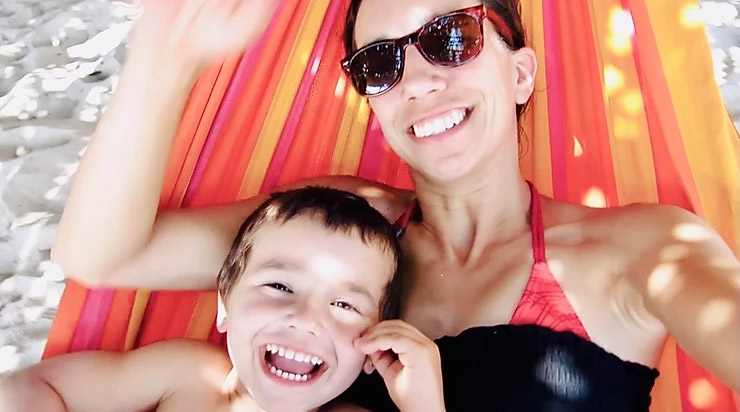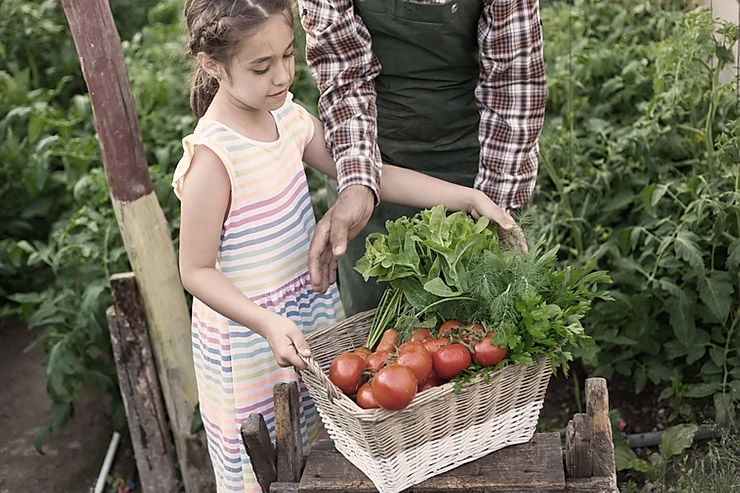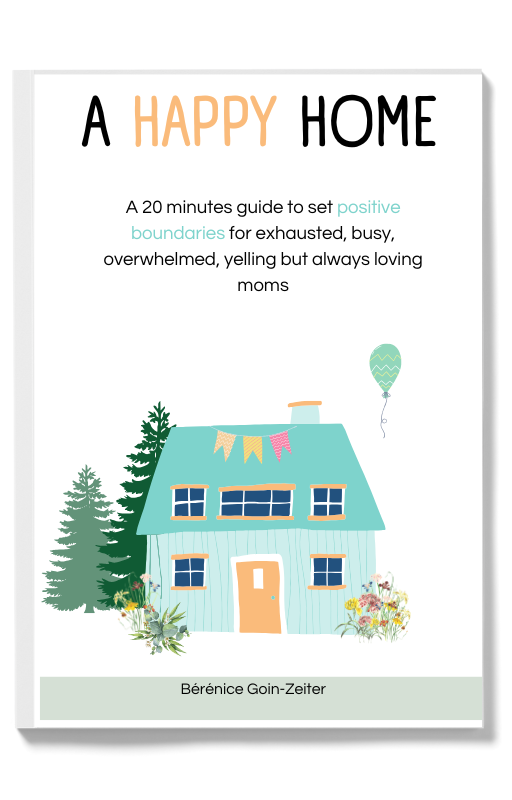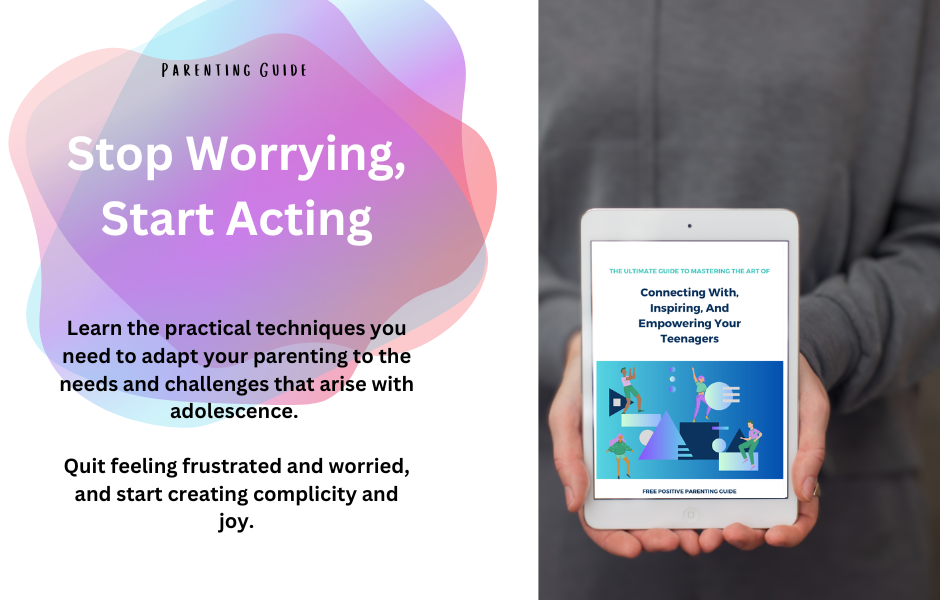
#5 Five Foolproof Ways To Become Top-Notch Parents
A few weeks ago, I was offered to write a chapter in a book about Self-Made Success.
At first, I thought it wasn’t for me. I’m just a Swiss woman, mother of 3, with a taste for adventure, self-confidence issues and a love for books . What self-made success could I share?
If you were asked to share a success story of yours, what would it be?
Then it struck me: my problem was the way I was looking at myself. So I tried what I call the American-lens because I noticed Americans are good at selling themselves and talking about their qualities.The American-lens
Business success
At 36, I’m creating my online company. It is still a baby, but it has strong roots. I know where I am going, I keep my mission in mind. I overcame my mindset issues about not being up to the task. It took me a whole year of self-work to get where I am. To be able to speak about my knowledge and skills in education with confidence and pride.
Studies success
Between the age of 25 and 30, I managed to get a degree in education while having 3 babies, a job on the side and a house to renovate (and a husband). The worst part was definitely writing the thesis.
Lifestyle success
At 31, I was bold enough to leave it all and go on a trip around the world with my family, with no idea where this would bring us. We had to deal with our fears, our families’ fears and our Swiss education (which is along the line of get a job, work hard, save money, be discreet, don’t dream too big).
Self-development success
In the past 5 years, I realized how my education, my culture, and my country defined me. I decided that I wanted to be me, free of all those ties (might be possible, still working on that). Anyway, I could define my mission, and start a spiritual journey.
Health success
At 33, I took on rock climbing even though I thought I was nothing like a sports girl and I had asthma. We climbed for months around North America and Mexico. At 35, I felt confident enough to try yoga. I loved it so much I started training to become a yoga teacher. Even if I had to start from scratches and am the least flexible person in the world.
Relationship success
In November, my husband and I will celebrate our 20 years together. We grew up into adulthood together and learned to respect each other’s choices. We are supportive and try to give the other one the freedom he needs to find his path.
But my biggest success, my biggest pride, is how I managed to become the mother I wished to be.
Motherhood success
I went on a life-changing trip in motherhood. I knew where to look. Five years of university talking about education gave me at least that.
I started with reading books about young children, homeschooling and non-violent communication. I felt frustrated because I couldn’t implement the great things I read. It was abstract. Little by little, I could see some changes though. So I kept going.
What did I want to change?
I was quite bad-tempered, I would often yell, get mad, look angry or disappointed. I could see it hurt my children. All the theories I learned at university didn’t help much. They were too theoretical, didn’t suit to practical life and daily struggles.
I read, I reflected, I took example on mothers I would meet and who behaved the way I wanted. I tested. And it became easier as I started to learn to transform theoretical into practical.

5 foolproof ways to become top-notch parents
This is what I wanted to share in this self-made success book: how to become an amazing mom for your children. I found out that with these five rules, a lot can change. For your children but also for yourself, because at the end of the day, you are the one feeling disheartened and disappointed in yourself sometimes. And I want you to feel proud and invigorated instead!
1. Tell the truth
I can hear you from here «I do not lie to my children! ».
Well, we’ll see. Because telling the truth is more than not lying, you know, it’s a way of living that encompasses different things.
Say what you do, do what you say.
Can you tell me that you’ve always respected that rule? Children have to follow us and do as we say, so it’s pretty easy to decide that a little change of program isn’t a big deal. You said you were going to the swimming pool but eventually you don’t feel like it? So you talk your kids out of it: « the weather isn’t that great, it’s a bit cold, what about I order pizzas instead? ». Never done something like that? I have for sure.
But in the end, you’re damaging the trust they have in you (yes, even for small things).
Great leaders always respect this rule, it makes them true. Authenticity is earned through efforts. It is through with behavior that you set an example for your children, and this rule should be the first one you apply.
The second part: « say what you do », is about not being secretive or seeing children as not smart enough to understand. Children can read our body language (remember that only 7% of communication is spoken, 93% is non-verbal), and the tone of our voice. If you are tired and need to rest, just say it. If you are angry and need a moment to cool off, say it. Children don’t like secrets, and they don’t like when their parents do things they don’t understand. The more you tell about your feelings, the better your relationship with your child.

I am not talking about telling your child about your job problems or how your mother-in-law is a pain. I am talking about the things that involve them directly.
By respecting this simple and yet essential rule, not only will you make your family life healthier but your children will do the same. They will be more open, they will share more and they will feel like they can be honest.
2. Treat your children like guests
Those of you who read the blog post about being polite to your children know where I’m heading here 🙂
You might think that this rule “treat them like guests” will lead to your home becoming a hotel and you a butler. Don’t worry, this is not what I mean.
Words can be a tool or a weapon. Take a minute and remember something negative that you were told as a child and that still lingers in your memory. Something like « you’ll never be an astronaut with those marks », « you eat like a pig », “you’re not graceful enough to join ballet class”,… Do you have it? I guess we all have. Mine was the ballet class one.
As a parent, we have real power, and I insist here, we have real power to plant seeds in our children’s minds. Seeds that will become limiting beliefs if repeated. I know that’s definitely not what you want and that is why I suggest you treat them as guests, in terms of politeness and respect.
When you’re about to say something negative, think about what you would say to a guest. Imagine you have friends at home. Find other ways to pass on your message.
Instead of saying: “move along!” you could say “I would like to go through”, instead of ignoring them, you could listen, instead of yelling, you could speak. Tomorrow, try it: when you’re about to tell something to one of your children, ask yourself how you would say/ask it to a guest. You might be surprised how often it’s not the same.
3. Speak from the heart
As you can see, we are still in the talk field. Thing is, a lot could be gained by speaking properly, so let’s see how to do that. You’ve already learned about speaking the truth and being respectful to your children.
Now you will learn a gem in human communication: speaking from the heart.
When doing so, you cannot hurt the other one, you avoid fights, you take a habit at positivity, you learn to express yourself and you communicate your emotions. Amazing isn’t it? And definitely reachable.
First of all, no judgment. When something happens, you can describe it but not judge it: « I see that the living room is a complete mess » instead of « what the Hell have you done in the living room?! ». Without judgment, the other one doesn’t feel accused, and the communication can exist. If your child feels the blame, there is good chances he will take refuge in aggressiveness and that’s the beginning of a yelling contest.
So, number one: no judgment. Number two? speak in “I”. It means speak about yourself, name your emotions « I am annoyed when I see the living room like that ». Can you see how different it feels?
When you put it like that, the other one doesn’t go into a fight, but he will be inclined to take your emotions into account.
And number three, state something rather than ask: « I am annoyed when I see the living room like that, I like it when it’s tidy ». That offers your child a chance to make up for his mess. Of course, it doesn’t mean it will work 🙂 You can try and add a couple more pieces of information about why this is a problem for you “I can’t go through the living room, there are so many things on the floor”.

It can feel a bit strange at first if you’ve never used non-violent communication before. but I’ve found out that once the children are used to be talked to that way, it is effective and so less trouble.
Describe the situation and how you feel about it. Your child will often know by himself what he is supposed to do. If he cannot achieve what you ask for, there is no point in asking. For example, your daughter decided to bake pancakes and there is flour all over the kitchen floor. In this situation, you could suggest to her that we could clean up together. This is a far more positive way to deal with the situation than ending up yelling, losing your voice, having your daughter crying in her room, miserable (she wanted to cook pancakes in the first place, which is nice, isn’t it?) and you cleaning up the mess alone and feeling guilty for yelling.
4. Stop helping them
If there is one thing children don’t like, it is to be helped. I can hear you arguing « oh yeah, but he quite likes it when I tidy up his room or cook him dinner! ». I wouldn’t be so sure about that.
Let’s not forget that since there were born, we give our children habits and we show them examples. Let’s say you don’t like cooking and you’re public about it, your child will think that cooking is a core, hence he will let you do it (he’s a smart little critter, isn’t he?).
Let’s take another example: your child doesn’t get dressed by himself? Or you have to tie his shoelaces? That’s on you. Don’t take it wrong, but he doesn’t want to do it, there is a good chance you created this behavior. Maybe you liked to help him and feel useful. Maybe you were always in a rush. Maybe you thought you knew better what clothes would be good for that day.
The good thing is that since it depends on you, you can change it. Children are very capable from a young age, but in our society we treat them like babies longer then necessary.
The way you speak to them or think of them will impact the way they think of themselves too. Therefore, if you think that they are not capable, they will think they’re not. Of course, it takes time to learn to tie one’s shoes, and you’re late and he’s fussing and you loose it and tie them for him (which gives this message: you’re too slow/not able, I’ll do it for you). You can change that by organizing yourself so that your child gets the time he needs. It is binding, time consuming and asks for patience, but what he learns today will save you a thousand time the moments you spent to let him learn.
Children love to be autonomous, and life is great when they are, so let’s give them a chance to accomplish that.

5. Change the way you look at them
Children are like us. They are not less . They are at a different moment of their lives, that’s it.
The child you used to be, it’s still you. You didn’t magically changed over night at 13 (apart from the smell and bad temper, that is). The child you were, the adult you are and the elder you will be are one person walking on the line of life.
And because they are like us, because they are « us », they like and need the same things we do, and they dislike some others just as we do.
Let me give you a simple everyday example: the family is invited for dinner at a friend’s place. You know that you’re expected at 7, so at 6 you start getting ready and at 10 to 7 you tell the children that it’s time to go. Now, how would you react if your husband was to do this to you? You’re comfortably reading in your couch and suddenly, your husband storms in, yelling that it’s time to go, NOW!
This example is to show you how we forget to take our children in consideration, just because they are « children ». We have this belief in our society that as grown-ups we get to choose and that one day, our children will be grown-up too and will get to choose for themselves too.
Can you see the issue here? They will get to choose for themselves but never had a practice at it earlier. Sure, we ask them if the’d rather go to the park or the pool, or if they’d rather study Spanish of French, but this isn’t real life, everyday life choices.
Given more autonomy and freedom, children are absolutely able to participate in the life of the family. In an active way. As soon as they walk, they will be glad to help with chores if you don’t present them like a pain. They will later happily help with the menus (remember the power of examples, if you eat only pizzas, they won’t suggest steamed broccolis). They will love to buy groceries if you let them, and therefore learn about food, prices and health. They can count and pay, the can cook. They can do anything if you give them the chance. So, yes, the kitchen will probably be a mess, but this is an opportunity to let them learn about responsibilities. When you cook, you clean up, that’s learning to finish something you started. How many adults lack this competence?Bonus tip for a happy family life
Here is an extra one that comes from the four agreement of Miguel Ruiz.
It will make your life easier whether with your children or in any relation: don’t take things personally.
If your child is aggressive or angry and you take it personally, you will have an emotional reaction that has nothing to do with the situation. Let’s say your child is putting on his jacket and he’s struggling, you come by and offer your help (thought you wouldn’t do that anymore because they don’t need help remember? but let’s say) and your child reacts violently towards you. Usually, you would get upset and yell at him that if it so, he can manage on his own and you leave, all miffed.
Now, if you look at the situation with some distance (always useful the distance), you will realize that your child is angry against himself for not managing, or against the jacket for being so hard to put on, but definitely not at you. And yet you yelled. And the message you gave was « you’re not allowed to express your frustration, that upsets mommy ». See? Don’t take things personally and you can forget about conflicts in your life.
What about that book then?
You might wonder what’s left for that book chapter now that I’ve given you my secrets. In the end I agreed on being part of the book. Though there weren’t enough writers and the project is left aside for now. May it come back to life, I’ll just have to come up with 5 more secrets to share 🙂
This adventure gave me the opportunity to reflect on my successes and the way I look at myself. It also gave me a chance to look back on our family life and see how we all worked together to make our life beautiful. Soon after i decided to improve my mother’s skills, my children jumped on the train and helped me out.
I wish you all an harmonious family life and blooming children.
Remember that when one wants to change, he changes already.
If you have any questions/comments/story you want to share, please do. If you think that this article might interest a friend of yours, share it.
See you next week.
Don’t Forget To Join Our Community To Get Inspiration And Tips Straight in Your Mailbox

I wish you all the best with your kids. Always remember — we’re all doing the best we can in any given moment, so try not to judge yourself too harshly. Be confident and listen to your intuition. If what you do comes from a place of love, then you’re already on the right path.

If this post resonated with you — if you’ve ever walked ten paces behind your child, wondering if you’re ruining everything — come join us on Instagram. It’s where I share reminders, reflections, and the odd parenting confession… for mums figuring it out one heart-twinge at a time.

If you want more resources, ⬇️ keep scrolling ⬇️
Looking for a way to set boundaries that feel fair for everyone? Here’s your home guide to healthy boundaries.

If your child is or is becoming a teenager, check out our parenting guide for teenagers!


